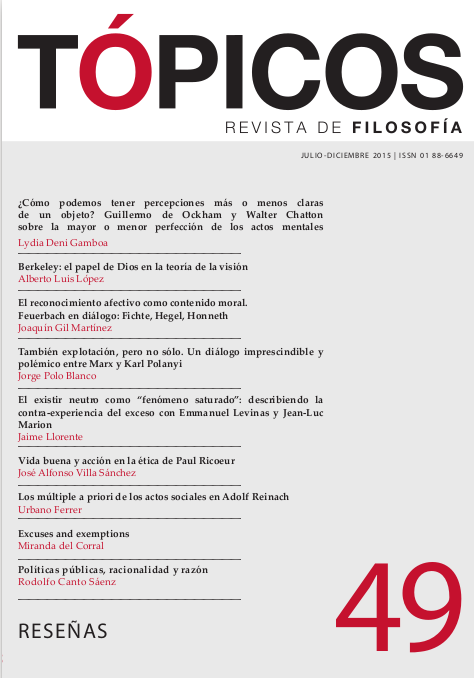¿Cómo podemos tener percepciones más o menos claras de un objeto? Guillermo de Ockham y Walter Chatton sobre la mayor o menor perfección de los actos mentales
Publicado 2015-07-31
Palabras clave
- Guillermo de Ockham,
- Walter Chatton,
- estados mentales,
- intensificación o reducción,
- filosofía de la mente
Cómo citar
Resumen
En el siglo XIV se propusieron dos teorías principales para explicar el aumento y la reducción de las cualidades, entendidas éstas como formas accidentales. Quienes defendían alguna de estas dos teorías sostenían que una cualidad aumenta o se reduce debido a que se añaden o se substraen partes de sí misma, o bien, que una cualidad aumenta o se reduce debido a que una nueva forma más o menos perfecta sustituye a la forma ya inherente en una cierta substancia. Ockham defendió la primera teoría con respecto a los estados mentales, entendidos como cualidades. Chatton defendió en sus primeros escritos ambas teorías y después sólo defendió la segunda. Las teorías de Ockham y Chatton están basadas en dos perspectivas distintas sobre la naturaleza del cambio o el movimiento. Ambas teorías, además, implican mecanismos distintos para regular la mayor o menor perfección de un estado mental.
Referencias
- Aristóteles. (1995). Física. G. R. de Echandía (Trad.) Biblioteca Clásica Gredos. Madrid: Gredos.
- Boehner, P. (1946). Ockham’s Theory of Signification. Franciscan Studies VI, 2, 143-170.
- Boler, J. F. (1985). Connotative Terms in Ockham. History of Philosophy Quarterly II, 1, 21-37.
- Brower-Toland, S. (2015). How Chatton Changed Ockham’s Mind: William Ockham and Walter Chatton on Objects and Acts of Judgment. En Intentionality, Cognition, and Mental Representation in Medieval Philosophy. Gyula Klima (Ed.) (204-234). New York: Fordham University Press.
- Courtenay, W. J. (1987). Schools & Scholars in Fourteenth-Century England. Princeton, N.J.: Princeton University Press.
- ____ (1990). Ockham, Chatton, and the London Studium: Observations on Recent Changes in Ockham’s Biography. En Die Gegenwart Ockhams. W. Vossenkuhl, R. Schönberger y O. Aicher (Eds.) (327-337). Weinheim: VCH-Verlagsgesellschaft, Acta humaniora.
- ____ (1999). The Academic and Intellectual Worlds of Ockham. En The Cambridge Companion to Ockham. (17-30). New York: Cambridge University Press.
- ____ (2008). Ockham and Ockhamism, Studies in the Dissemination and Impact of His Thought. Leiden; Boston: Brill.
- Dumont, S. D. (2009). Godfrey of Fontaines and the Succession Theory of Forms at Paris in the Early Fourteenth Century. En Philosophical Debates at Paris in the Early Fourteenth Century. S. F. Brown, T. Dewender y T. Kobusch (Eds.) (39-126). Leiden; Boston: Brill.
- Gál, G. (1967). Gualteri de Chatton et Guillelmi de Ockham controversia de natura conceptus universalis. Franciscan Studies XXVII, 5, 191-212.
- Goddu, A. (1984). The Physics of William of Ockham. Leiden: E.J. Brill.
- Karger, E. (1995). William of Ockham, Walter Chatton and Adam Wodeham on the Objects of Knowledge and Belief. Vivarium XXXIII, 2, 171-96.
- Keele, R. (2010). Ockham Explained: From Razor to Rebellion. Chicago: Open Court.
- Kelley, F. E. (1981). Walter Chatton vs. Aureoli and Ockham Regarding the Universal Concept. Franciscan Studies XLI, 1, 222-49.
- Kim, J. (2006). Philosophy of Mind. Boulder, Colo.: Westview Press.
- King, P. (2005). Rethinking Representation in the Middle Ages. En Representation and Objects of Thought. H. Lagerlund (Ed.) (83-102). Aldershot [etc.]: Ashgate Publishing Ltd.
- Klima, G. (1999). Ockham’s Semantics and Ontology of the Categories. En The Cambridge Companion to Ockham. P. V. Spade (Ed.) (118-142). New York: Cambridge University Press.
- Kretzmann, N., Kenny, A. y Pinborg, J. (Eds.) (1982). The Cambridge History of Later Medieval Philosophy: From the Rediscovery of Aristotle to the Disintegration of Scholasticism, 1100-1600. Cambridge [Cambridgeshire]; New York: Cambridge University Press.
- Marenbon, J. (1987). Later Medieval Philosophy (1150-1350): An Introduction. London; New York: Routledge & K. Paul.
- McCord Adams, M. (1979). Was Ockham a Humean about Efficient Causality? Franciscan Studies XXXIX, 1, 5-48.
- ____ (1987). William Ockham. Vol. 2. Notre Dame, Ind.: University of Notre Dame Press.
- ____ (1998). Ockham on Final Causality: Muddying the Waters. Franciscan Studies LVI, 1, 1-46.
- Panaccio, C. (1983). Guillaume d’Ockham, signification et supposition. En Archéologie du signe. L. Brind’Amour y E. Vance (Eds.) (265-86). Toronto, Ont.,: Institut pontifical d’études médiévales.
- ____ (2004) Ockham on Concepts. Aldershot, Hants, England; Burlington, VT: Ashgate Pub.
- Robert, A. (2008). L’explication causale selon Guillaume d’Ockham. Quaestio II, 1, 241-66.
- Spade, P. V. (1975). Ockham’s Distinctions between Absolute and Connotative Terms. Vivarium XIII, 1, 55-76.
- Trifogli, C. (2000). Oxford Physics in the Thirteenth Century (Ca. 1250-1270). Motion, Infinity, Place, and Time, Leiden; Boston: Brill.
- ____ (2010). Change, Time and Place. En The Cambridge History of Medieval Philosophy. R. Pasnau y C. van Dyke (Eds.) 1. (267-278). Cambridge, UK; New York: Cambridge University Press.






